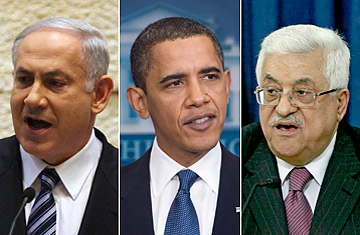
From left: Israeli Prime Minister Benjamin Netanyahu, U.S. President Barack Obama and Palestinian Authority President Mahmoud Abbas
It has taken President Obama just 10 months to achieve something each of his immediate predecessors delivered in their final year in office: failure in the Middle East peace process. Riding a wave of optimism in January, the President on his second day in office named retired Senator George Mitchell as his Middle East special envoy, tasked with kick-starting the dormant negotiations over a two-state solution to the Israeli-Palestinian conflict. Despite his best intentions, Mitchell's — and Obama's — efforts have managed only to undermine peace advocates on all sides and have pushed hopes for a final agreement into the distant future. The President now faces tough choices over how to proceed.
Obama distinguished himself from his predecessors by attacking the problem early; Bill Clinton and George W. Bush waited until their lame-duck years to do so. Moreover, Obama faced perhaps the worst Middle East peacemaking environment inherited by any President in decades. He took office as Israel was wrapping up its costly and controversial offensive against Hamas militants in the Gaza Strip, an operation that produced accusations of war crimes by a U.N. human-rights investigation and galvanized anti-Israel sentiment around the world. Within weeks, Israel's electorate had installed a right-wing governing coalition beholden to parties opposed to a Palestinian state and committed to expanding Israeli settlements on territories captured in 1967. On the Palestinian side, he faced an enfeebled and fractured leadership, further burdened by rising expectations owing to a perception that Obama would be more sympathetic to the Palestinian cause.
Obama quickly exacerbated these problems with a series of tactical mistakes. He drew a line in the sand over Israeli settlements, insisting that all construction outside Israel's 1967 borders stop in order to revive negotiations. Not only did this set a politically unachievable goal for Israeli Prime Minister Benjamin Netanyahu, it meant that anything short of a full freeze would look like a loss for Palestinian Authority President Mahmoud Abbas. Abbas was already politically damaged by the Gaza war; anything less than full Israeli compliance — particularly in East Jerusalem, which the Palestinians see as the capital of their future state — became politically intolerable for him, and he refused to negotiate until Israel complied with Obama's demand.
Washington then made matters worse by pressuring a reluctant Abbas to visit the U.N. General Assembly in New York for a handshake photo opportunity with Obama and Netanyahu, then sending him home with no tangible wins. By the fall, Abbas was talking of resigning. "Through either clumsiness or misunderstanding or outright error, they hurt him to the extent that he felt he had to step down," says Robert Malley, a former U.S. Middle East peace negotiator now with the International Crisis Group.
By year's end, the process remained in a stalemate: Israel had offered a partial settlement freeze but not enough to get the Palestinians back to the table. And most of the negotiating action was going on via back channels between Israel and Hamas, the radical rulers of Gaza, over an exchange of Palestinian prisoners for the captive Israeli soldier Gilad Shalit. (If Hamas succeeds in freeing hundreds of Palestinian prisoners by playing hardball with the Israelis, a Shalit deal would further undermine Abbas in the eyes of his own people.)
The Administration's failures have led many to urge scrapping the entire approach and trying something new. Some are pushing for the U.S. to deal separately with Israel and the Palestinians and try to forge a deal in the role of intermediary. The problem with that approach is that failure would be even more costly, since the U.S. would own the process, and would leave nowhere to go.
Others say the U.S. should walk away and let the parties go to the table themselves when they are ready to talk — an approach reminiscent of James Baker, but no more likely to succeed now than it did in the early 1990s.
Palestinian Prime Minister Salam Fayyad is emphasizing a bottom-up approach that focuses on creating the infrastructure of Palestinian statehood through economic development and empowering security and administrative structures. Some Western observers even argue that any final-status talks should be abandoned for now to concentrate on backing Fayyad's efforts. But Palestinians are unlikely to remain quiescent without some hope for early statehood. (Fayyad is an independent, rather than a member of President Abbas' Fatah movement, and is not representative of a significant political base.)
European Union leaders are taking Fayyad's idea further, pressing in the direction of some form of international recognition of Palestinian claims to a state based on the 1967 borders: "We are all in the international community defending the two-state solution," said Spain's Foreign Minister Miguel Moratinos, whose country on Dec. 18 inherited the E.U. presidency for next year. "Why should we wait for a Palestinian state? We have Israel as a state. We want its neighbor, the Palestinians, to have the same status." Moratinos emphasized that this should be achieved through negotiation. But his statement, taken together with a recent E.U. declaration urging negotiation to resolve the status of Jerusalem "as the future capital of two states" — an idea that Netanyahu refuses to even discuss — signals growing European impatience with Israel.For now, though, the Administration is sticking with its approach of pushing for direct talks on a two-state solution, hoping that continued pressure will bring the Israelis and Palestinians to the table. If negotiations can be restarted, Washington is confident of making progress. If not, it will face the same kind of full-scale policy review that it undertook on Afghanistan and Iran — only much later, and after much more damage to the process.
